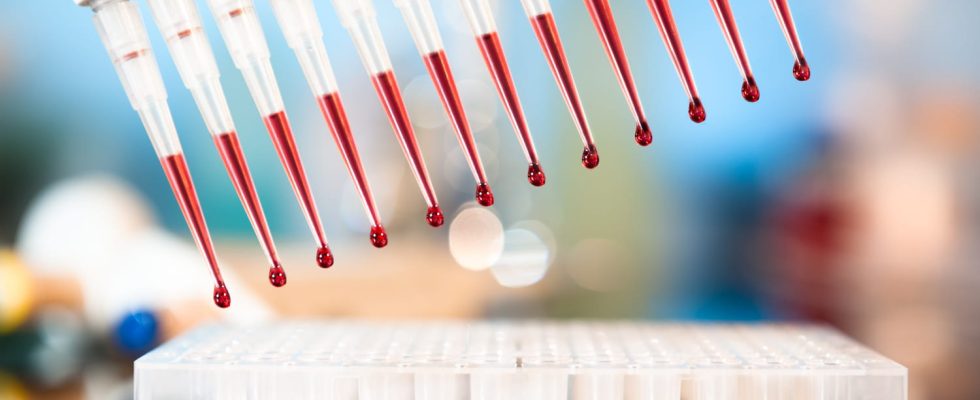Electrophoresis (EPP) is an analytical technique that makes it possible to separate and quantify the proteins present in the blood (albumin, globulin). What are the directions? How to interpret the results?
Electrophoresis is a analytical technique that separates and quantifies the proteins present in the blood (albumin, globulin). This examination sometimes called “EPP” can detect immune, inflammatory, cirrhotic, nephrotic diseases, but also cancers. What is electrophoresis?
Definition: what is electrophoresis?
Plasma proteins are contained in the liquid part of the blood, called “plasma”. They perform various functions of transport, defense of the body, regulation of water exchange between the blood and the various tissues… Among the plasma proteins, we essentially distinguish between albumin and globulins of different types: Alpha 1-globulin, Alpha 2-globulin, Beta 1 and Beta 2 – globulins, Gamma globulin. To separate these proteins into fractions to identify and quantify them, there is a biological test called plasma protein electrophoresis (or PPE). Concretely, this examination separates the different proteins under the action of an electric field. “Electrophoresis can be performed sany physiological fluid suspected of containing proteins“ explain Nicolas Stocker and Pierre-Édouard Debureaux, hematology interns. This analysis makes it possible to confirm the diagnosis of certain attacks on the immune system, but also to diagnose many inflammatory, cirrhotic, nephrotic syndromes and also certain infections, gammopathies or cancers.
What is the standard rate?
In accordance with the indications on your analysis sheet, the results must lie, for the following different proteins, between:
- Albumin : 55 and 65% i.e. 36 and 50 g/L.
- Alpha1 – globulins : 1 and 4% i.e. 1 and 5 g/L.
- Alpha 2 – globulins : 6 and 10% i.e. 4 and 8 g/l.
- Beta – globulins : 8 and 14% i.e. 5 and 12 g/L.
- Gamma – globulins : 12 and 20% i.e. 8 and 16 g/L.
► Albumin level. “Several factors can explain a decrease in albumin levels, such as hemodilution, malnutrition, intestinal malabsorption, nephrotic syndrome, liver pathologies (cirrhosis or liver cancer) or protein losses, of digestive, cutaneous or urinary origin” continue Nicolas Stocker and Pierre-Édouard Debureaux. On the other hand, a high albumin level can be a reflection of possible dehydration.
► The dosage of alpha 1 – globulin is performed by blood test and must be between 1 to 4 g/l. The level of alpha 1 – globulins can be reduced in situations of hepatocellular insufficiency, nephrotic syndrome or congenital alpha-1 antitrypsin deficiency. The increase may be indicative of an acute or chronic inflammatory syndrome, or be found during pregnancy.
► The level of alpha 2-globulins can be reduced in the context of malnutrition, hepatocellular insufficiency, certain intestinal diseases, or hemolysis. “The increase can be indicative of an inflammatory syndrome, acute or chronic, as well as a nephrotic syndrome”according to Nicolas Stocker and Pierre-Édouard Debureaux.
► The level of Beta-globulins can be reduced in a situation of malnutrition, hepatocellular insufficiency, certain intestinal diseases, or nephrotic syndrome. Conversely, its increase can be indicative of iron deficiency, hypothyroidism or gallstones in particular.
► The level of gammaglobulins decreases in cases of primary immunodeficiencies, and in particular in situations of immune deficiencies secondary to treatment (corticosteroids, immunosuppressants, etc.). The rate increases in situations of chronic inflammatory diseases (rheumatoid arthritis and systemic lupus erythematosus), infections, solid cancer or malignant hemopathy in particular. “A monoclonal peak is a large, isolated increase in a fraction of the electrophoresis and may reflect a pathology depending on its quantification and the fraction concerned” continue Nicolas Stocker and Pierre-Édouard Debureaux.
What to do after receiving the results of the electrophoresis?
The standards differ according to the techniques used by the laboratories. Be aware that the results alone do not constitute a diagnosis. It is therefore important to consult your general practitioner in order to discuss with him any additional examinations or any treatment, depending on the pathology suspected and then diagnosed.
Thanks to Nicolas Stocker and Pierre-Édouard Debureaux, interns in hematology, respectively President and Treasurer of the Association of Interns in Hematology (AIH).
